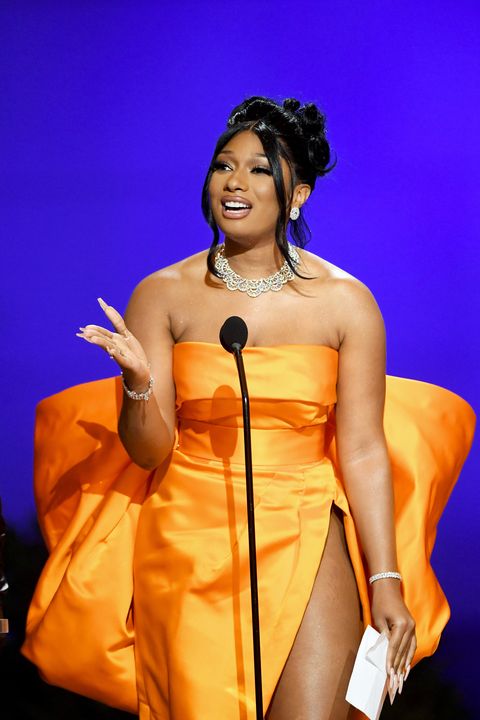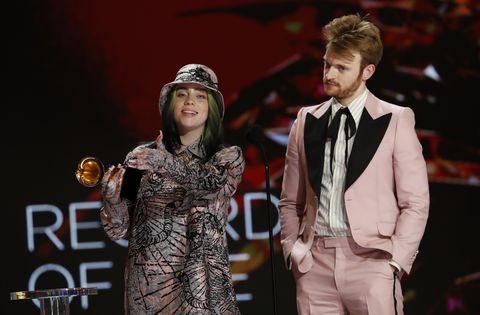Apologies to the fans, but you’re not needed here. An audience-free Grammys took place Sunday night for a broadcast that, while far too long and still far from perfect (we’ll get to it, don’t worry, there’s plenty), positively glowed with the sounds of now. Dua Lipa, Bad Bunny, Megan Thee Stallion, DaBaby, Haim, and a dizzying list of other young, relevant, and almost exclusively-nominated singers and songwriters (Harry Styles! Billie Eilish! Lil Baby!) came to Los Angeles and performed the music we most wanted to hear—their own.
If you’ve only been alive, as I have, for the Ken Ehrlich era of the Grammys—the former producer retired following the 2020 iteration after helming 40 ceremonies—you, too, are elated with the evolution. Among other things, Ehrlich is famous for not inviting Lorde, the lone female Album of the Year nominee in 2018, to perform her own music; and “stifling” Ariana Grande’s creativity to the point of her canceling her own 2019 performance; and booking a lengthy Fame musical montage in the year 2020.
Ben Winston took over show-running duties this year alongside former Grammys and Oscar-alum Jesse Collins, and together they stared down ever-dwindling ratings, the ongoing COVID-19 pandemic, and an exodus of talent from the hip-hop and R&B upper echelons to completely reinvent the Grammys as we know them.
While nothing can likely compare to the furor that preceded the 2020 ceremony, when then-Recording Academy CEO Deb Dugan filed a bombshell discrimination complaint against the organization that blew the cover off both her own gross mistreatment, as well as the murky, unethical voting practices that take place each year, the 2021 lean-in was hardly without controversy.
On Thursday of last week, the Weeknd announced that he would no longer allow his label to submit his music to the Recording Academy for Grammy consideration. The decision came months after the show’s baffling snub of his 2020 LP, After Hours, one of the biggest and best sets of the year, from this slate of nominations. He was especially offended, he later confirmed, by the zero nods because he was in talks, he said, for weeks regarding a performance slot.
The Grammys has an extremely well-documented history of using artists of color for ratings-gathering performances while continuously overlooking their creations for the evening’s biggest awards. Consider these facts: Kendrick Lamar, a favorite of showrunners for his bombastic live renditions, has somehow won a Pulitzer, but has lost each of the three times he has been nominated for Album of the Year. JAY-Z has been nominated 80 times at the Grammys during a career that has earned him a spot of the first rapper ever inducted into the Songwriters Hall of Fame—but he has collected zero all-genre awards. Kanye West hasn’t fared much better: He has been nominated 70 times while still failing to win a single Big Four trophy.
This is especially upsetting when you consider that hip-hop was, without question, the most dominant genre of music in the 2010s in America. It is a fact beyond debate. And yet you will not find a single rapper on the list of Album of the Year winners for that same time period. In fact, to find the most recent hip-hop Album of the Year winner, you have to scroll all the way back to 2004 when Outkast collected for Speakerboxxx/The Love Below. Record of the Year has only been infinitesimally better in the last decade, handing out a single (one!) trophy to a rap song, to Childish Gambino for “This Is America.”
Looking outside of hip-hop, only ten artists of color, from any genre, have ever won Album of the Year in the history of the ceremony. The award has been handed out annually since 1957.
The recent fallout has been undeniable.
Frank Ocean declined to submit Blonde, his much-loved 2016 return to music, for Grammy recognition following its release. “Winning a TV award doesn’t christen me successful,” he later wrote on tumblr. JAY-Z did not attend the ceremony for six straight years in protest, beginning in the late 90s, returning only in 2004 to support his wife. His appearance in the years since has been sporadic, at best, and he has not performed since 2014. Gambino, the aforementioned lone rapper to be recently recognized didn’t bother to attend the 2019 ceremony when he won a major category award. And that same year, Drake used his time at the mic to offer a curt reminder: “Awards don’t matter.” Last fall, West released a video of himself literally peeing on one of his own Grammy trophies.
Earlier this month, Zayn Malik tweeted, “Fuck the grammys and everyone associated, Unless you shake hands and send gifts, there’s no nomination considerations.”
What happens if an entire sect of music—wildly popular music, at that—stops showing up? That question is no longer hypothetical. It’s becoming increasingly obvious that the Grammys need these names far more than they need trophies. Which brings us to a strange 2021 ceremony, where the Recording Academy had two crises to contend with—one of its own making and a global pandemic to navigate.
One area where the broadcast experienced an unlikely, but nearly overwhelming victory was in its response to COVID-19 precautions. Technically, it was a downgrade in terms of performance space when the Recording Academy gave up its longtime home inside the Staples Center in favor of the Los Angeles Convention Center down the street. Nominees sat at socially distanced tables outside awaiting the results while performers hosted on a variety of small soundstages inside.
This content is imported from YouTube. You may be able to find the same content in another format, or you may be able to find more information, at their web site.
There was much lip syncing and very few truly live moments—BTS, who lost Best Pop Duo/Group Performance to Lady Gaga and Ariana Grande’s, offered the evening’s most-anticipated performance, taped from Seoul—but it was a remarkable upgrade from set lists of years past. Turns at the mic felt raw and delicate and more communal than ever. Even if they weren’t live, that artists were in the room interacting with each other’s’ creations was unnervingly delightful. Harry Styles watching Billie Eilish watching Haim in an enclosed performance space; Bad Bunny off to the side dancing to Dua Lipa’s technicolor rendition of “Levitating”—it was almost uncomfortably intimate. I felt desperate to know what they all said to each other on their breaks from filming, and I hope even once the After truly arrives that this format remains.
(Though under no circumstances should we ever have 20-plus performances again.)
Historically, women have also not fared too well in the hands of Grammy voters and programmers. But on Sunday, in terms of awards—of which there were exponentially more than usual, though still not enough, handed out live—they fared remarkably well. Taylor Swift became the first female to win Album of the Year three times; Megan Thee Stallion won Best New Artist and Best Rap Song; Miranda Lambert won Best Country Album; H.E.R. won Song of the Year; Dua Lipa won Best Pop Vocal Album; Beyonce won Best R&B Performance; and Billie Eilish won Record of the Year.
But even with her wins on Sunday the Recording Academy can never do right by Beyonce. No number of future awards can ever close the gap on her past stats—not even the enthusiastic recognition that after tonight, she has the most golden gramophones of any other artist, ever. Ms. Knowles has 28 Grammy trophies lining her shelves now, a staggering achievement. But just one came from the all-genre awards field: Song of the Year in 2009 for “Single Ladies (Put A Ring On It).” She has never won Album of the Year, nor Record of the Year, and she was never the Best New Artist.
It’s an oversight I can never get past. Her talent is too vast, her impact too undeniable. The way we dance and dress and talk—about pain and joy and pride and Blackness and womanhood—has been so shaped by her work that it’s hard to find the true beginning and end of her influence.
It seemed like, for the past few years, this was also a slight the singer was not looking to forgive. Before tonight, she had not been in attendance at the annual broadcast since 2018. She still hasn’t walked a red carpet since her Lemonade lost to Adele’s 25—something Adele even felt the need to apologize for, awkwardly, during her acceptance speech. And she hasn’t performed since 2017.
Interim Recording Academy chief executive Harvey Mason Jr. confirmed earlier this weekend that Beyonce would not make an appearance at this year’s ceremony. And in the pre-taped promotional films for each Record of the Year nominee, the singer was the lone nominated artist who did not sit down for an interview for their creation, indicating she was perhaps not planning to attend, again.
In a surprise move, she offered them just a few minutes of her time, in the third hour of the broadcast, when she arrived to the shock of both myself and her “Savage” collaborator, Megan Thee Stallion, to collect Best Rap Song and, soon after, Best R&B Performance for “Black Parade.” Much ado was made about her historic tally, and she seemed genuinely pleased and emotional. Her departure was as swift as her arrival—and now that she owns this record, there’s no telling if she’ll return. Somehow that feels just as right, to me.
What the Recording Academy can, and should, do, however, is do right by the next generation. Mason Jr. made a plea to artists and viewers in a brief recorded statement during the broadcast, begging everyone to “work with us not against us as we build a new Recording Academy.” For a while tonight it looked like they might pave a path forward that music fans and artists deserve when they awarded Megan Thee Stallion a Best New Artist gramophone. The Houston MC—and self-proclaimed “rap Beyonce”—also performed twice during the broadcast. First with a gilded age take on “Savage,” which did more for the future of tap dancing in three blistering minutes than the past 30 years have, and then the first televised performance of (a veryveryveryveryveryvery cleaned up version of) “WAP” with Cardi B.
As Record of the Year neared, I felt hopeful that either Beyonce or Megan would hear their name one final time. “Savage” was, without contest, the song of 2020. Bey was long gone, though, and it was Billie Eilish’s unlikely name that rang out for “everything i wanted,” a very fine song that in no way defined the last year in music. “This is really embarrassing for me,” she said during her speech, trophy in hand. “Megan, girl… I was gonna write a speech about how you deserve this but then I was like, ‘There’s no way they’re going to choose me.’ I was like, ‘It’s hers.’ You deserve this.”
She did deserve it. And the apology streaming from the stage felt all too familiar.
This content is created and maintained by a third party, and imported onto this page to help users provide their email addresses. You may be able to find more information about this and similar content at piano.io







